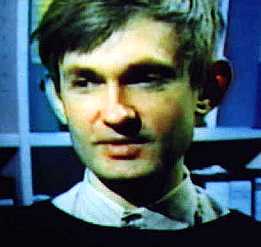 Picture
(taken Feb 1999): BBC, courtesy James Oberg.
Picture
(taken Feb 1999): BBC, courtesy James Oberg.
Dear Friends, Maxim Vladislavovich
Tarasenko was killed by a car late Friday evening in Zelenograd where he
lived. His step-son was injured. Maxim was one of the most brilliant researchers
and historians of the Soviet/Russian space program, a key member of Novosti
Kosmonavtiki magazine staff,
and member of the FPSPACE list. We suffered a huge loss.
Igor Afanasyev, Igor Lissov
Novosti Kosmonavtiki
The death of Maxim Tarasenko is truly a loss for the space community. Though I did not (as far as I know) meet him during my trip to Baikonur in 1992, I'm sure that the N1 material shared with me by Charlie Vick following your 1997 trip was greatly enhanced by the efforts of Maxim. His efforts will be missed.
Ed Cameron
Dwayne Day
Sven Grahn
To which Dwayne Day replied:
I think that in many ways that perfectly sums up Maxim. Whereas one of the main problems with reporting on Soviet-era space history is that so many of the Russian chroniclers/memoirists have an ideological or bureaucratic axe to grind (hence, ten different stories of an event), Maxim was interested in the facts and the truth and approached his subject with an objective view. It was his greatest strength as a researcher and historian.
It was a terrible shock to get the news of Maxim Tarasenko's death. He was surely one of the best, most forthright, and hardest-working of the Russian space scholars, and a gentle and close friend. I simply would not have been able to write the KOROLEV book without his immense help and advice. I have since had occasion to refer numerous Americans and Europeans to him and he has been invaluable to them as well.
With deep sadness, Jim Harford
I am still completely in
shock about the news. He was one of the most truly brilliant historians
in the field, and it was a joy to always read his works. He was also one
of the most generous researchers in the field and helped me immensely in
my work through the past few
years. My sincere condolences
go out to his family and friends, as well as the staff of Novosti kosmonavtiki.
This is a truly terrible loss.
Asif Siddiqi
Maxim was born in Protva, in the Kaluga Region south of Moscow on 20 June 1962. He received a Diploma with Excellence, Physicist-Engineer in Spacecraft Dynamics and Flight Control from the Department of Aerophysics and Space Research of the Moscow Institute of Physics and Technology (MIPT) in 1985. He studied shockwave dynamics for his graduate work and was awarded a PhD (Candidate of Science) degree in Physics and Math with a specialty in Fluid, Gas and Plasma Dynamics by MIPT in 1988. Maxim became a Research Associate at MIPT and Chair of Continuous Media upon graduation.
His plans had been to work in aerospace engineering, but upon graduation he became interested in space policy and the history of cosmonautics, both domestic and foreign. In the early 1990's he spent a year as a visiting student at the Woodrow Wilson School of Public and International Affairs at Princeton University in New Jersey. The next year he was a Visiting Fellow at the Bulletin of the Atomic Scientists in Chicago where he studied Science and International Security journalism.
From 1991 to the present he was a Research Associate at the Center for Arms Control, Energy and Environmental Studies at MIPT where he developed an independent expertise of national space activities, conducted analyses of space programs and policies both in Russia and abroad, and became an internationally recognized expert on space program histories. His special interest was the development of both the Soviet and American space programs through the Cold War. The last of several times that I saw Maxim was at an arms control conference held at Cornell University in New York where he was to deliver several papers. This was just one of many international speaking engagements of his. He had delivered a paper on the 'Reorganization of the FSU Space Program and Its Influence on Space Activities Worldwide' at the IAF in Graz, Austria in 1993. His 1994 IAF paper in Jerusalem, Israel was entitled 'From Confrontation to Competition and Cooperation: Roadblocks and Bypasses'. The list of papers and international places is too long to go into at this point. I mention